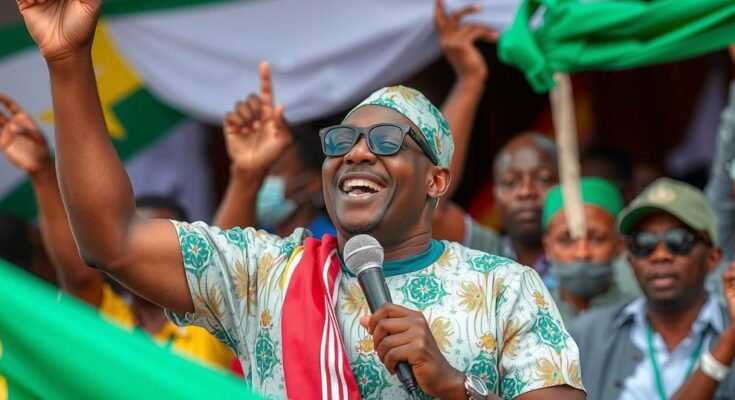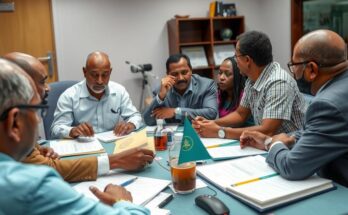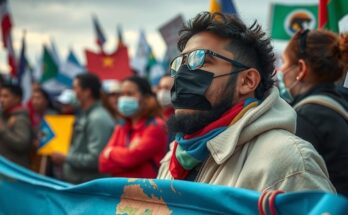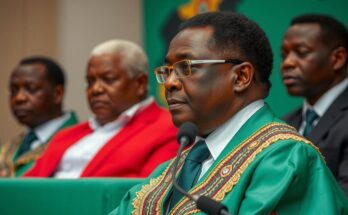Ghana’s opposition claims provisional election results indicate that John Mahama has won the presidential election against Vice President Mahamudu Bawumia. Economic difficulties dominated the campaign, prompting calls for change. While the electoral commission is still tallying official votes, internal party assessments suggest Mahama has received 56.3 percent of the vote. Two deaths marred the election, yet voting occurred largely peacefully.
On Sunday, Ghana’s opposition party proclaimed that provisional election results indicated its candidate, John Mahama, triumphed in the presidential election held over the weekend. Meanwhile, electoral officials stated that official tallies were still in the process of being compiled. The election featured a significant contest between Mahama, representing the National Democratic Congress (NDC), and the ruling New Patriotic Party (NPP) candidate, Vice President Mahamudu Bawumia, who faced challenges primarily associated with economic dissatisfaction and rising living costs. The economy, beset by challenges such as debt defaults, devaluation, and high inflation that ultimately necessitated a $3 billion bailout from the International Monetary Fund, was the central focus of this electoral battle. Voters were tasked with electing a successor to President Nana Akufo-Addo, who is concluding his two-term presidency while also selecting a new parliament.
Sammy Gyamfi, a spokesperson for the NDC, informed the press that their internal analysis indicated Mahama had secured 56.3 percent of the votes compared to Bawumia’s 41.3 percent. “It is very clear the people of this country have voted for change,” Gyamfi asserted. Independently, a local television channel reported preliminary results showing Mahama in the lead, although the electoral commission’s Deputy Commissioner, Bossman Asare, reiterated that the tallying process was still ongoing with regional results yet to be reported at the national level. Official results from the electoral commission are anticipated by Tuesday, while Bawumia is also scheduled to address the media on the matter.
Voting was mostly conducted peacefully, though it was marred by violence that resulted in two fatalities during the election. Ghana has a rich history of democratic stability, with power alternating between its two major political parties—the NPP and the NDC—since the country transitioned to a multi-party system in 1992. Bawumia campaigned under the slogan “Break the 8,” aiming to secure an unprecedented third consecutive term for the NPP. However, he has struggled to overcome the unfavorable perceptions of the economic record from the current administration. Despite some positive trends in inflation and macroeconomic indicators, many voters remained deeply frustrated with prevailing economic conditions, which facilitated Mahama’s resurgence, who previously served as president from 2012 to 2017 but faced defeats in his subsequent candidacies.
The political landscape in Ghana has been characterized by a strong democratic tradition since the return to multi-party politics in 1992. The two major political entities, the National Democratic Congress (NDC) and the New Patriotic Party (NPP), have alternated governance. As the nation faces economic challenges—including high inflation and a recent IMF bailout—these issues have significantly influenced the political discourse and voter sentiment. The 2024 election not only seeks to determine the presidency following the term-limited exit of President Nana Akufo-Addo but also elect a new parliament amidst rising public dissatisfaction with economic management.
In summary, Ghana’s recent presidential election has sparked a significant declaration of victory by the opposition, asserting that provisional results favor their candidate, John Mahama. As the electoral authorities continue to compile official results, it remains evident that economic concerns have heavily influenced the electorate’s decision. The culmination of these factors could potentially reshape Ghana’s political landscape, as a historic transition may be underway following a prolonged period of NPP governance.
Original Source: www.france24.com




